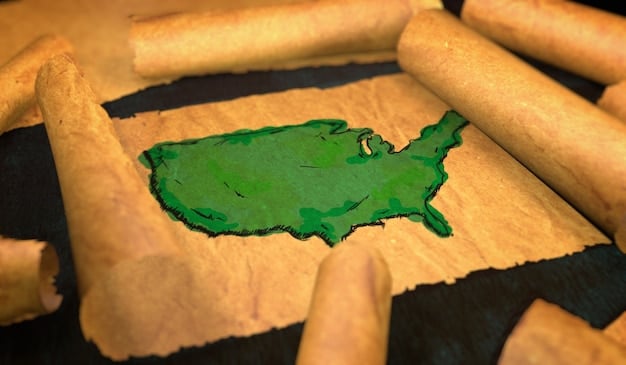State Marijuana Laws: Legalization Efforts Across the US

State marijuana laws vary significantly across the U.S., with each state having its own approach to legalization, ranging from complete prohibition to full legalization for recreational and medicinal purposes, reflecting diverse public opinions and policy priorities.
Navigating the complex landscape of state marijuana laws in the U.S. can be confusing. This article breaks down the current status of legalization efforts across the country, providing insights into the different approaches and ongoing debates.
Current Status of Marijuana Legalization in the US
The United States has seen a significant shift in attitudes and policies regarding marijuana over the past few decades. Today, numerous states have legalized marijuana in some form, whether for medicinal or recreational use, while others maintain strict prohibition.
Understanding the current landscape requires a look at the different categories of legalization and the specific laws in place across various states.
Recreational vs. Medicinal Marijuana
One of the key distinctions in state marijuana laws is between recreational and medicinal use. Recreational legalization allows adults to purchase and use marijuana for personal enjoyment, similar to alcohol. Medicinal legalization, on the other hand, permits the use of marijuana for specific health conditions with a doctor’s recommendation.
- Recreational Marijuana: Typically involves regulations on the amount that can be purchased and possessed, as well as taxes on sales.
- Medical Marijuana: Usually requires patients to obtain a medical card and adhere to specific guidelines regarding the conditions for which marijuana can be used.
- Decriminalization: Some states have decriminalized marijuana, reducing penalties for possession of small amounts to a fine rather than jail time.

Many states that initially legalized medical marijuana have since moved to recreational legalization, reflecting a growing acceptance of marijuana use.
States with Legal Recreational Marijuana
As of 2024, a significant number of states have legalized recreational marijuana. These states have established regulatory frameworks for the cultivation, distribution, and sale of marijuana products.
Examining these states provides insights into the potential economic and social impacts of legalization.
Key States and Their Laws
Several states have been at the forefront of recreational marijuana legalization, setting precedents for other states to follow. Here are a few notable examples:
- California: Legalized recreational marijuana in 2016. Adults aged 21 and over can purchase, possess, and use marijuana. The state has a robust regulatory system for licensed businesses.
- Colorado: Was one of the first states to legalize recreational marijuana in 2012. The industry has generated significant tax revenue, which is used for various public programs.
- Washington: Also legalized recreational marijuana in 2012. The state has strict regulations on the production and sale of marijuana, including testing and labeling requirements.
- Oregon: Known for its progressive marijuana policies, Oregon allows adults to grow a limited number of plants at home for personal use.
These pioneering states have demonstrated that recreational marijuana can be regulated and taxed effectively, providing a model for other states considering legalization.

Recreational marijuana legalization has led to new industries, job creation, and increased tax revenues in states that have adopted it.
States with Medical Marijuana Programs
Many states that have not yet legalized recreational marijuana have established medical marijuana programs. These programs allow patients with qualifying conditions to access marijuana for therapeutic purposes.
Understanding the details of these programs is critical for patients and healthcare providers.
Qualifying Conditions and Regulations
Medical marijuana programs typically require patients to obtain a recommendation from a licensed physician and register with the state. Common qualifying conditions include:
- Chronic pain
- Epilepsy
- Cancer
- Multiple sclerosis
Regulations vary by state, but often include restrictions on the amount of marijuana that can be possessed and the types of products that can be sold. Some states also allow patients to grow their own marijuana.
Medical marijuana programs provide an alternative treatment option for patients who have not found relief through traditional medications.
States with Decriminalization or Limited Access
Some states have taken steps to reduce penalties for marijuana possession without fully legalizing it. These states often focus on decriminalization, which treats possession of small amounts as a minor offense.
Decriminalization can reduce the burden on the criminal justice system and prevent individuals from facing severe penalties for minor marijuana offenses.
Decriminalization vs. Legalization
Decriminalization differs from legalization in that it does not establish a legal market for marijuana. Instead, it reduces the penalties for possession to a fine or civil infraction.
States with decriminalization policies include:
- Ohio: Implemented medical marijuana program, but recreational use remains illegal.
- Nebraska: Possession of small amounts of marijuana is a civil infraction, not a criminal offense.
- North Carolina: Limited medical marijuana programs are in place for specific conditions.
These states represent a middle ground between full legalization and complete prohibition.
States with Strict Marijuana Prohibition
A handful of states still maintain strict marijuana prohibition, with no legal access for either recreational or medical use. These states often have some of the harshest penalties for marijuana possession.
Understanding the reasons behind prohibition is essential to comprehending the diverse perspectives on marijuana policy.
Reasons for Prohibition
States that maintain prohibition often cite concerns about public health, safety, and potential social harms. Opposition to legalization can also stem from moral or ideological beliefs.
States with strict prohibition include:
- Idaho: All forms of marijuana use are illegal.
- Kansas: Limited exceptions only for CBD oil with low THC.
Despite changing attitudes nationwide, these states remain firm in their opposition to marijuana legalization.
Future of Marijuana Legalization Efforts
The future of marijuana legalization in the U.S. is uncertain but dynamic. Several factors are likely to influence the direction of policy in the coming years, including public opinion, economic considerations, and federal action.
Tracking these developments is essential for understanding the evolving landscape of marijuana laws.
Potential Federal Action
Federal marijuana policy remains a significant obstacle to widespread legalization. While some members of Congress have introduced legislation to deschedule or decriminalize marijuana at the federal level, these efforts have yet to be successful.
The potential for federal action could have profound implications for state marijuana laws, either by allowing states to set their own policies without federal interference or by establishing a national regulatory framework.
Marijuana policy continues to evolve across the United States, reflecting diverse perspectives and evolving public opinions.
| Key Point | Brief Description |
|---|---|
| ✅ Recreational Legalization | Adults can purchase and use marijuana for personal enjoyment. |
| ⚕️ Medical Marijuana | Use permitted for specific health conditions with a doctor’s recommendation. |
| ⚖️ Decriminalization | Reduced penalties for possession of small amounts to a fine. |
| 🚫 Strict Prohibition | No legal access for recreational or medical use. |
Frequently Asked Questions
▼
Recreational marijuana is for personal enjoyment, similar to alcohol, while medicinal marijuana is used for specific health conditions with a doctor’s recommendation. Recreational use is often subject to taxes, and you do not need a prescription.
▼
States like California, Colorado, and Washington have legalized recreational marijuana, establishing regulatory frameworks for its cultivation, distribution, and sale. These states permit adults over 21 to buy cannabis products.
▼
Common qualifying conditions include chronic pain, epilepsy, cancer, and multiple sclerosis. Patients usually need a recommendation from a licensed physician and must register with the state to be eligible.
▼
Decriminalization means that the penalties for possessing small amounts of marijuana are reduced to a fine or civil infraction rather than criminal charges. This does not create a legal market, such as that created by legalization.
▼
Yes, a few states still maintain strict marijuana prohibition, with no legal access for either recreational or medical use. Idaho and Kansas are examples of states with some of the harshest penalties.
Conclusion
The landscape of state marijuana laws in the U.S. is varied and constantly evolving. From full legalization to strict prohibition, each state reflects its unique approach to this complex issue, influenced by public opinion, economic considerations, and concerns about public health and safety.





